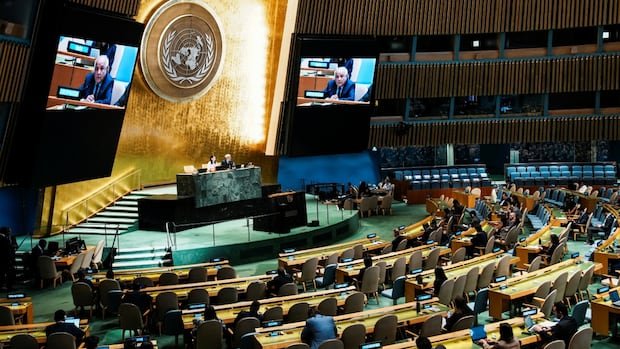Several global leaders are set to officially acknowledge the establishment of a Palestinian state during a summit hosted by France and Saudi Arabia on Monday, a decision that Israel argues will hinder the chances of a peaceful resolution to the conflict in Gaza. While the gathering in New York may uplift Palestinian spirits, it is unlikely to bring tangible changes on the ground, where Israel remains firm in its stance against the Hamas militant group and rejects the idea of a Palestinian state.
The summit follows a recent United Nations investigation that accused Israel of committing genocide in Gaza, a claim strongly refuted by Israel as biased and scandalous. The once pivotal two-state solution, initiated through the U.S.-backed Oslo Accords of 1993, has faced significant setbacks and is now virtually defunct due to resistance from both sides.
Israel and the United States have opted to boycott the summit, with Israel’s UN Ambassador Danny Danon dismissing the event as a “circus.” On the contrary, countries like Britain, Canada, Australia, and Portugal have already recognized a Palestinian state, with France and five other nations expected to follow suit at the upcoming UN General Assembly.
Despite a growing number of European nations acknowledging a Palestinian state, both Germany and Italy have signaled reluctance to take a similar step in the near future. Germany, historically a staunch supporter of Israel due to the Holocaust, has become more critical of Israeli policies and insists that recognition of a Palestinian state should be part of a political process leading to a two-state solution.
Italy has expressed concerns that recognizing a Palestinian state could have counterproductive effects. In contrast, Russia maintains its belief that a two-state solution remains the most viable approach to resolving the conflict, emphasizing the urgent need for a peaceful resolution amid the current heightened tensions in the region.
Israel, facing mounting criticism over its military actions in Gaza, is contemplating annexing parts of the West Bank in response, a move that could strain diplomatic relations with key countries like the United Arab Emirates. The UAE, a significant player in the Arab world and a signatory to the Abraham Accords normalizing ties with Israel, has warned that annexation would undermine the spirit of the agreement.
The U.S. administration has cautioned against taking measures that could harm Israel, including potential repercussions for countries like France, which is hosting the New York summit. Against a backdrop of escalating violence and geopolitical tensions, the urgency for action toward a two-state solution is increasingly apparent to prevent its fading into obscurity.
France, spearheading efforts to advance the recognition of a Palestinian state, aims to bolster global momentum for the two-state solution, particularly following President Macron’s commitment to recognizing Palestine. The push for recognition underscores a broader international effort to uphold the principles of a two-state solution amid ongoing conflicts and humanitarian crises in the region.

